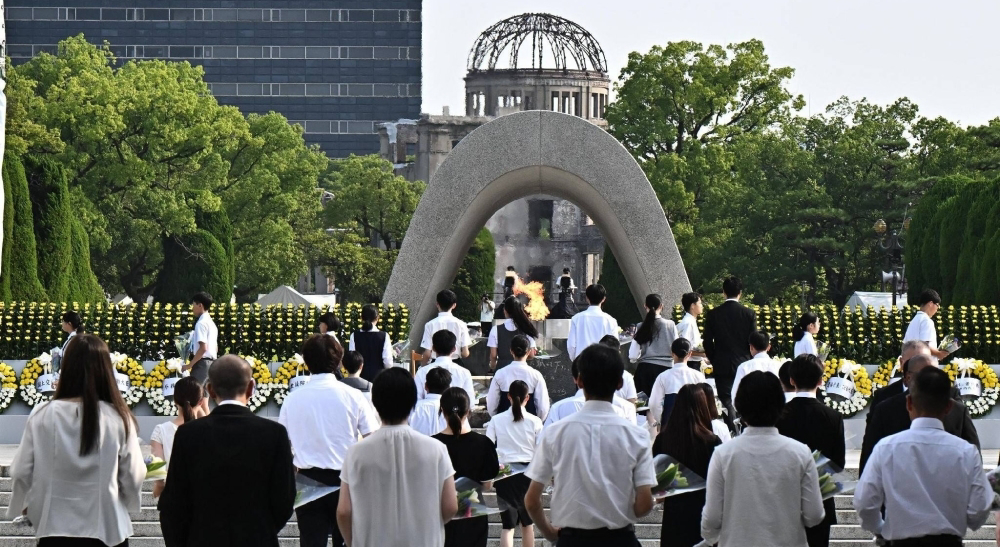
Hiroshima citizens place flowers at the Cenotaph, commemorating those lost in the atomic bombing of the city, on Tuesday, the 79th anniversary of the attack.
United Nations, August 6 (RHC)--United Nations Secretary General Antonio Guterres has warned against the "real and present danger" of nuclear weapons, as Japan marks the 79th anniversary of the U.S. atomic bombing on the city of Hiroshima that massacred nearly 140,000 people and for which Washington has never offered an apology.
“Nuclear weapons, and the threat of their use, are not confined to history books. They have once again appeared in the daily rhetoric of international relations,” Guterres said in a message on Tuesday. “They represent a real and present danger that remains with us today,” he noted.
On August 6, 1945, during World War II, an American bomber dropped the world’s first deployed atomic bomb on the city of Hiroshima, killing more than 140,000 people. Three days later, a second bomber dropped another atomic bomb on Nagasaki, killing an estimated 74,000 people.
There has never been an official apology from Washington for its nuclear bombings of the two Japanese cities. The U.S. has rather been careful not to apologize while only expressing sorrow over the colossal destruction it caused.
The U.S. continues to boastfully justify the bombings and the ensuing carnage, contending that they were necessary to end the war and “save lives,” although many historians question that view and insist they were unjustified.
“The lessons of Hiroshima, which once guided our collective efforts towards disarmament and peace, have been pushed aside,” Guterres said.
Seventy-nine years ago, despite the fact that his military advisors suggested they drop the bomb on an uninhabited island in the Pacific to show Japan the destruction it was capable of causing and that Tokyo was getting ready to surrender anyway, U.S. President Harry S. Truman ordered the bomb dropped on a heavily populated Japanese city. In the months and years after the terrorist bombing, the worlds first nuclear attack also left thousands of survivors to slow and agonizing deaths from burns and radiation sickness.
The UN chief highlighted that lessons must be learnt from the atomic bombing of the Japanese city of Hiroshima by the US that any use of a nuclear weapon will have catastrophic humanitarian consequences, and that the only path to eliminate the threats posed by nuclear weapons is to eliminate them altogether.
Guterres went on to argue that while “some are recklessly rattling the nuclear saber once more,” the UN is making endeavors to keep alive the lessons of the 1945 tragedy.
“The lesson that the use of nuclear weapons is unacceptable. The lesson that a nuclear war cannot be won — and must never be fought. And the lesson that we need disarmament now,” he stressed.
He also called on the world to stand together to condemn “this unacceptable behavior” and find new solutions to bring disarmament to life.
“We will never forget the lessons of August 6, 1945. No more Hiroshimas. No more Nagasakis,” the UN chief concluded.

